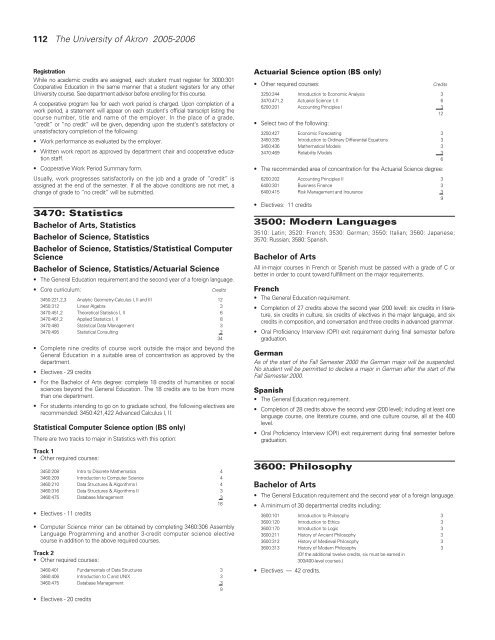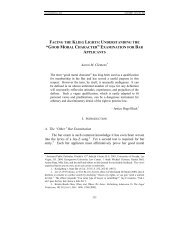Calendar 2005-2006 - The University of Akron
Calendar 2005-2006 - The University of Akron
Calendar 2005-2006 - The University of Akron
Create successful ePaper yourself
Turn your PDF publications into a flip-book with our unique Google optimized e-Paper software.
112 <strong>The</strong> <strong>University</strong> <strong>of</strong> <strong>Akron</strong> <strong>2005</strong>-<strong>2006</strong><br />
Registration<br />
While no academic credits are assigned, each student must register for 3000:301<br />
Cooperative Education in the same manner that a student registers for any other<br />
<strong>University</strong> course. See department advisor before enrolling for this course.<br />
A cooperative program fee for each work period is charged. Upon completion <strong>of</strong> a<br />
work period, a statement will appear on each student’s <strong>of</strong>ficial transcript listing the<br />
course number, title and name <strong>of</strong> the employer. In the place <strong>of</strong> a grade,<br />
“credit” or “no credit” will be given, depending upon the student’s satisfactory or<br />
unsatisfactory completion <strong>of</strong> the following:<br />
• Work performance as evaluated by the employer.<br />
• Written work report as approved by department chair and cooperative education<br />
staff.<br />
• Cooperative Work Period Summary form.<br />
Usually, work progresses satisfactorily on the job and a grade <strong>of</strong> “credit” is<br />
assigned at the end <strong>of</strong> the semester. If all the above conditions are not met, a<br />
change <strong>of</strong> grade to “no credit” will be submitted.<br />
3470: Statistics<br />
Bachelor <strong>of</strong> Arts, Statistics<br />
Bachelor <strong>of</strong> Science, Statistics<br />
Bachelor <strong>of</strong> Science, Statistics/Statistical Computer<br />
Science<br />
Bachelor <strong>of</strong> Science, Statistics/Actuarial Science<br />
• <strong>The</strong> General Education requirement and the second year <strong>of</strong> a foreign language.<br />
• Core curriculum: Credits<br />
3450:221,2,3 Analytic Geometry-Calculus I, II and III 12<br />
3450:312 Linear Algebra 3<br />
3470:451,2 <strong>The</strong>oretical Statistics I, II 6<br />
3470:461,2 Applied Statistics I, II 8<br />
3470:480 Statistical Data Management 3<br />
3470:495 Statistical Consulting 2<br />
34<br />
• Complete nine credits <strong>of</strong> course work outside the major and beyond the<br />
General Education in a suitable area <strong>of</strong> concentration as approved by the<br />
department.<br />
• Electives - 29 credits<br />
• For the Bachelor <strong>of</strong> Arts degree: complete 18 credits <strong>of</strong> humanities or social<br />
sciences beyond the General Education. <strong>The</strong> 18 credits are to be from more<br />
than one department.<br />
• For students intending to go on to graduate school, the following electives are<br />
recommended: 3450:421,422 Advanced Calculus I, II.<br />
Statistical Computer Science option (BS only)<br />
<strong>The</strong>re are two tracks to major in Statistics with this option:<br />
Track 1<br />
• Other required courses:<br />
3450:208 Intro to Discrete Mathematics 4<br />
3460:209 Introduction to Computer Science 4<br />
3460:210 Data Structures & Algorithms I 4<br />
3460:316 Data Structures & Algorithms II 3<br />
3460:475 Database Management 3<br />
18<br />
• Electives - 11 credits<br />
• Computer Science minor can be obtained by completing 3460:306 Assembly<br />
Language Programming and another 3-credit computer science elective<br />
course in addition to the above required courses.<br />
Track 2<br />
• Other required courses:<br />
3460:401 Fundamentals <strong>of</strong> Data Structures 3<br />
3460:406 Introduction to C and UNIX 3<br />
3460:475 Database Management 3<br />
9<br />
• Electives - 20 credits<br />
Actuarial Science option (BS only)<br />
• Other required courses: Credits<br />
3250:244 Introduction to Economic Analysis 3<br />
3470:471,2 Actuarial Science I, II 6<br />
6200:201 Accounting Principles I 3<br />
12<br />
• Select two <strong>of</strong> the following:<br />
3250:427 Economic Forecasting 3<br />
3450:335 Introduction to Ordinary Differential Equations 3<br />
3450:436 Mathematical Models 3<br />
3470:469 Reliability Models 3<br />
6<br />
• <strong>The</strong> recommended area <strong>of</strong> concentration for the Actuarial Science degree:<br />
6200:202 Accounting Principles II 3<br />
6400:301 Business Finance 3<br />
6400:415 Risk Management and Insurance 3<br />
9<br />
• Electives: 11 credits<br />
3500: Modern Languages<br />
3510: Latin; 3520: French; 3530: German; 3550: Italian; 3560: Japanese;<br />
3570: Russian; 3580: Spanish.<br />
Bachelor <strong>of</strong> Arts<br />
All in-major courses in French or Spanish must be passed with a grade <strong>of</strong> C or<br />
better in order to count toward fulfillment on the major requirements.<br />
French<br />
• <strong>The</strong> General Education requirement.<br />
• Completion <strong>of</strong> 27 credits above the second year (200 level): six credits in literature,<br />
six credits in culture, six credits <strong>of</strong> electives in the major language, and six<br />
credits in composition, and conversation and three credits in advanced grammar.<br />
• Oral Pr<strong>of</strong>iciency Interview (OPI) exit requirement during final semester before<br />
graduation.<br />
German<br />
As <strong>of</strong> the start <strong>of</strong> the Fall Semester 2000 the German major will be suspended.<br />
No student will be permitted to declare a major in German after the start <strong>of</strong> the<br />
Fall Semester 2000.<br />
Spanish<br />
• <strong>The</strong> General Education requirement.<br />
• Completion <strong>of</strong> 28 credits above the second year (200 level); including at least one<br />
language course, one literature course, and one culture course, all at the 400<br />
level.<br />
• Oral Pr<strong>of</strong>iciency Interview (OPI) exit requirement during final semester before<br />
graduation.<br />
3600: Philosophy<br />
Bachelor <strong>of</strong> Arts<br />
• <strong>The</strong> General Education requirement and the second year <strong>of</strong> a foreign language.<br />
• A minimum <strong>of</strong> 30 departmental credits including:<br />
3600:101 Introduction to Philosophy 3<br />
3600:120 Introduction to Ethics 3<br />
3600:170 Introduction to Logic 3<br />
3600:211 History <strong>of</strong> Ancient Philosophy 3<br />
3600:312 History <strong>of</strong> Medieval Philosophy 3<br />
3600:313 History <strong>of</strong> Modern Philosophy<br />
(Of the additional twelve credits, six must be earned in<br />
300/400-level courses.)<br />
3<br />
• Electives — 42 credits.

















